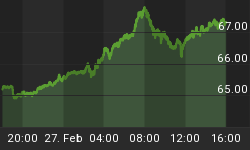Anyone who doubted, pre-election, that markets like gridlock need only survey recent headlines and earnings reports to realize just how wrong they were.
According to one Bloomberg article companies are finally loosening their grip on cash reserves, which they had clutched so tightly since the financial crisis of 2008.
What does this mean? It means companies are finally seeing the light at the end of the tunnel, and are willing to (a) invest in expansion projects and, more importantly, (b) hire new employees, albeit at a restricted pace.
One example is restaurant chain Buffalo Wild Wings, whose CEO, Sally Smith, is quoted in the Bloomberg article as saying that the company will add roughly 5500 new jobs and 100 new locations in the next year.
Corporations' optimism that is fueling increased spending has been further boosted by earnings reports. Most of those recently released reports have been reflected extremely strong performance; in some cases numbers are even nearing pre-crash highs.
All of these factors have lead money managers to begin taking a much more bullish stance on equities, which is a real change in tune over the past three or four months.
With renewed optimism among advisors and big business, the market has done quite well so far this year. Some believe (ourselves included) that we may be approaching a much-needed correction, since the market has rallied substantially over the past twenty-four months. However, that correction as so far remained unseen.
The market's performance and the celebration of business has been somewhat overshadowed by political turmoil, most notably the unrest in Egypt and the debate raging in Washington over America's national budget. It seems that [thankfully] there is going to be a real conversation in this country about what our government is spending, for the first time in a long time.
In the same vein, it now appears that many of the policies that had worried business are mostly dead in the water. Healthcare, though well-meaning, is being reviewed by several states concerned with its constitutionality. There is also a possibility that Congress will simply de-fund many of the programs. Likewise, little mention has been made of Cap and Trade. Perhaps the strength of the economy and availability of jobs have finally become a more important issue that greenhouse gases.
Thankfully, so far things have developed more or less according to our previous predictions, many of which were published (re: Gridlock Achieved, Tight Ships Don't Need Bailouts). We expected the outlook for the economy to improve with gridlock, and for the market to follow suit.
Now, on to what we expect from here...
First, corporations will [hopefully] continue spending, but with cash reserves as opposed to borrowed money. They'll keep hiring as they've begun to do, but be strategic about their hiring, so unemployment figures aren't likely to improve drastically, at least not initially.
The markets, having staged an impressive rally over two years with only one serious correction, are probably due for another pause. The fall of 2008 is still fresh in the minds of many investors, so this market isn't likely to get ahead of itself due to another about of "irrational exuberance."
At any rate, it looks like big business is back in style; and for now the sailing looks relatively smooth, considering everything we've had to deal with over the past five years. It's about time.















